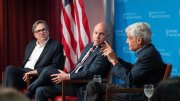Physicians Glen Crawford '80 and Susan Abkowitz Crawford '80 have practiced medicine all over the world. The orthopedic surgeon and the internist are two of several thousand American health professionals who have spent four- to six-week stints volunteering through Orthopedics Overseas and Health Volunteers Overseas (HVO) to teach foreign doctors and nurseswith mutual benefits. "When we were in Bhutan," Glen recalls, "there were 10 days when we didn't have an x-ray machine and I had to diagnose what was going on based only on my physical examinations. I now feel more confident when I'm treating complex cases here at home."
 |
 |
| Glen Crawford (top) consults with a Tanzanian colleague; Susan Crawford (above) visits a recovering patient in Bhutan. |
| Karl Grobl photograph (top) |
As an internist, Sue works in clinics and hospital wards, treating patients with malaria, tuberculosis, and typhoid. Glen works in the major local hospital, operating and teaching the staff: "He is often the only orthopedic surgeon in the country," Sue explains. "On the other hand, while I can teach local physicians about diabetes, heart disease, and strokes, I don't know much about typhoid and cerebral malaria, so I learn a lot from them." Their larger community outreach is limited, she says, "because what we practice can't really be done well in the countryside. However, the countryside comes to us." Unfortunately, patients' illnesses "are very far advanced by the time they come to us. People don't come in with sore throats that they've had for a few daysthey come throwing up blood."
The Crawfords emphasize that the main purpose of their work abroad is to teach the country's medical professionals, rather than treat patients. "We never do anything without someone watching," Glen says. "Whenever I did an operation, I usually had 10 to 12 people watching me; sometimes I was guiding them through the procedure." On a recent trip to India, they helped teach assistant medical officers, who learn basic medical skills and are then sent out to treat people in rural areas. Even if only a part of what they teach is remembered, the Crawfords say they are indirectly helping thousands of patients long-term.
"We feel that we can accomplish twice as much abroad," Glen says, "because in this country, there is so much paperwork and so many other things that don't involve taking care of patients." Sue, in fact, has given up her private practice, partly to be rid of the demands of healthcare paperwork; she now works for the International Medical Equipment Collaborative (IMEC), which sends donations of used medical equipment to developing countries. The couple look forward to spending more time overseas. "My colleagues complain all the time about how medicine has changed," Glen points out. "I tell them that all they have to do is go someplace less fortunate, and they'll have a chance to practice medicine the way it 'used to be.'"





